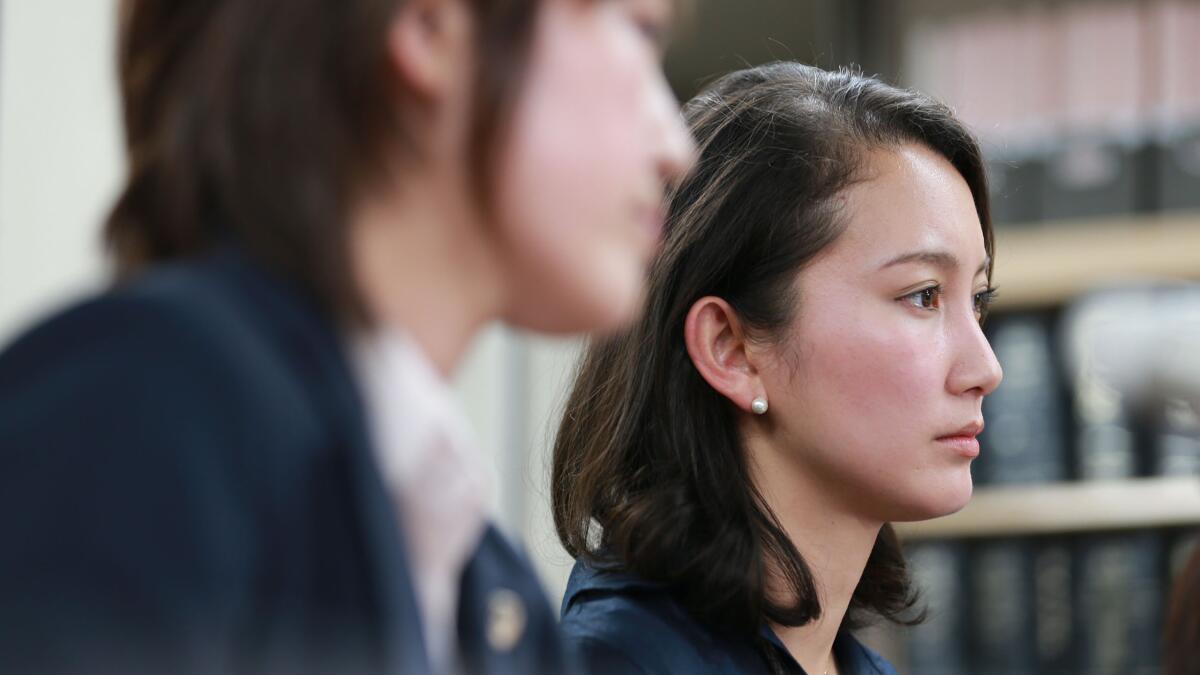She sparked Japan’s #MeToo reckoning. Then she made a documentary about it

- Share via
When Shiori Ito alleged at a 2017 news conference that Noriyuki Yamaguchi, a prominent TV journalist and friend of Japan’s then-Prime Minister Shinzo Abe, had two years earlier drugged and raped her in a Tokyo Sheraton hotel, she hoped the revelation would spark media interest in her case. But instead, the young journalist was subjected to online trolling and so many threats that she vacated her apartment, eventually retreating to London.
There, in the company of Hanna Aqvilin, a Swedish producer-director she’d met only via Skype, Ito’s determination resurfaced. “I started feeling like maybe I needed to do something, my own investigation as a journalist but also as a survivor,” she says while sitting in a cushioned alcove at the Four Seasons Hotel. “People in London said, ‘I want to make your documentary.’ And I didn’t want them to. I wanted to tell my own story.’”
She wrote a memoir about the trauma, which some credit with starting Japan’s #MeToo movement, while pursuing legal cases against Yamaguchi for much of that intervening period. All this fed into her documentary, “Black Box Diaries,” in which Ito uses everything she can think of — secretly recorded telephone conversations, security footage, confessional iPhone diary entries — to convey the personally bruising saga that unfolded after her alleged sexual assault, from the legal proceedings against her well-known offender to an examination of Japan’s archaic rape laws, and her own post-trauma emotions. Interspersed are scenes of Ito working on her memoir.
The documentary’s bracing reportage reveals Ito’s gift for in-depth journalism and, having previously made only short TV documentaries, her resourcefulness as a no-budget filmmaker. “We never had a team — no proper cameraman, no proper soundman,” she says. “Me and Hanna just did everything. It’d be great if we could film more cinematically, with better audio. But in the end, it really helped because no one pressured us.”
Ito and Aqvilin weren’t worried, for example, that audiences might find it confusing that Ito occasionally recorded her iPhone diary entries in English instead of in her native Japanese. “We never even thought about it,” says Ito, adding that she thinks of English as a tool that assists her in voicing anger and frustration. “Growing up in Japan, I didn’t know how to put my emotions in Japanese. I don’t see myself this way, but some people tell me, ‘When you speak Japanese, you are sweeter, nicer, bowing all the time. You act different when you speak English.’ That’s what language and culture can do to you.”
Though she wrote in her book that she believed Yamaguchi sedated her with a date-rape drug, there’s a reason that allegation isn’t in the film: Even though Ito won damages for the sexual encounter in a civil suit that she pursued after authorities declined to arrest Yamaguchi on criminal charges, a Tokyo court ordered her to pay him 550,000 yen (about $3,673) for defamation related to the drug allegation. “We won [the lawsuit], but we lost the part where I said I suspected he drugged me,” she says, noting that at that time in Japan, authorities had no way to check for such drugs.
To get around potential liability in “Black Box Diaries,” Ito purchased grainy security footage from the hotel and let viewers see Yamaguchi struggling to haul her lifeless-looking body from the back of a cab, then later hoisting her up as she stumbles unsteadily through the hotel lobby.
A recurring figure in “Black Box Diaries” is a police investigator who, instead of helping a potential victim of a sex crime seek justice, offers excuses. But sometimes good Samaritans emerge. One memorable moment involves Ito’s phone conversation with a hotel doorman who had offered to testify on her behalf. “He remembered talking to police,” Ito says, and believing he’d be called to court for a criminal trial. After he saw on the news that the case was closing, he contacted her.
Over five years, Ito had amassed more than 400 hours of footage, but there was more to discover. A year into editing, “Black Box Diaries” editor and co-producer Ema Ryan Yamazaki discovered on Ito’s iPhone an anguished suicide message meant to be seen by her parents that Ito had no recollection of filming. That too made it into the documentary.
Since its Sundance premiere, “Black Box Diaries” has been shown at film festivals around the world, including in Hong Kong, where a long line of people waited to share with Ito, one on one, their own painful experiences. “On one hand, as a journalist, I really wanted to listen,” Ito says. “But on the other hand, I’m a survivor, not a therapist. I just had to find a way to cope.”
Not much later, she booked herself into a 10-day silent meditation retreat.
The film staff saw much in Park City, Utah, during the 40th annual Sundance Film Festival. Here were our 10 top picks: stirring dramas and documentaries.
One of Ito’s goals for the documentary is to have it shown in Japan, where it has yet to get distribution. She’s on the fence, though, about having family members — who haven’t seen “Black Box Diaries” — watch her journey play itself out on the big screen. “They know that I made it, and they’re proud,” says Ito, whose hesitation is also rooted in concerns about how cinema patrons in her home country will respond. “Japanese audiences, in general, they’re so respectful. So maybe I should bring them to the States where they will see more reaction like this,” says Ito, clapping her hands like a boisterously applauding moviegoer. “That’s my next little mission.”
More to Read
From the Oscars to the Emmys.
Get the Envelope newsletter for exclusive awards season coverage, behind-the-scenes stories from the Envelope podcast and columnist Glenn Whipp’s must-read analysis.
You may occasionally receive promotional content from the Los Angeles Times.







